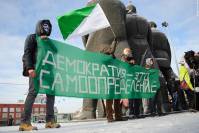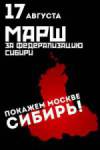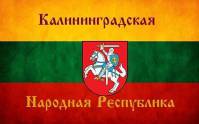Russian censor’s attempts to silence home-grown federalists backfire
 Democracy is self-determination
Democracy is self-determination
Federalization, which the Kremlin is so aggressively pushing for Ukraine, is clearly a dirty word closer to Moscow. A word that can get civic activists and those who report their peaceful protest plans, into trouble. Nonetheless the current feverish moves seen by the Russian Prosecutor General to block all mention of home-grown calls for real federalization are proving spectacularly counter-productive
At least 15 websites, including Ukraine’s TSN.ua, have received formal warnings from Roskomnadzor, Russia’s media and Internet surveillance body demanding that they withdraw publications reporting an initiative by Artem Loskutov and some other activists in Siberia who are planning to hold a ‘March in support of Siberian Federalization.
According to TSN.ua, it was warned that access to its site would be blocked if they did not remove the information. This was based on a demand from the Prosecutor General’s Office from Aug 1. The publication was deemed to ‘contain calls to mass disturbances, to carry out extremist activities, take part in mass (public) events, with infringement of the established procedure”.
TSN.ua decided that it was important that readers in Russia continued to have access to their Russian language version ru.tsn.ua and deleted the information. It states that at least 14 other sites have come up against the same problem, naming Polit.ru; Regnum; Novy Region; Rosbalt and Slon.ru. There have also been attempts, thus far fully successful only on VKontakte to have information about the initiative removed from social networks.
The event that has set the Prosecutor General and Roskomnadzor into overdrive is a march in support of Siberia’s federalization, scheduled for Aug 17 in Novosibirsk. Their action, under the slogan “We’ve had enough of feeding Moscow!” is aimed at achieving greater autonomy by creating a Siberian republic within the Russian Federation. Autonomy from Russia will enable the people of Siberia to: introduce benefits and wage supplements for people living in harsh climactic conditions; introduce a regional component to the tax on extracting precious metals, resulting in a fairer divide between local and federal budgets; exercise their constitutional right to their own authorities who are more independent of the centre and to remove the idiotic situation whereby all decisions are taken by the government in Moscow.

No call to arms, no demand to overthrow the constitution. Quite the contrary, they simply wish to exercise a constitutionally enshrined right.
It is not clear whether the texts on each of the minimum 15 sites were different. An interview with Loskutov has been translated into English by Euromaidan Press. It seems likely that this annoyed Russia’s Prosecutor because it is impossible to read without one highly seditious question coming to mind. Why is Moscow pushing federalization in Ukraine when it brooks little or no autonomy at local level at home?. Siberia, in particular, hands over its vast wealth and gets only “dumb laws” and a governor chosen by the president in exchange.
The contrast is also highly telling. Moscow is defending ‘the rights’, as well as heavily arming and manning so-called separatists in eastern Ukraine who call Ukraine a foreign country; who have repeatedly suggested joining the Russian Federation and even more frequently called for Russia to send in troops to support them. The federalists in Siberia are really only asking for a little bit more say over what happens in their part of the Russian Federation and over the wealth their area brings in.
On Aug 2, the Belarusian opposition site Charter 97 reported learning from its American provider Amazon that due to a demand from the Russian Prosecutor General the webpage with the news item “Siberians want to proclaim a Siberian republic” is restricted by operators on Russian territory.
Russian opposition politician Boris Nemtsov writes that the Kremlin is convulsively fighting separatism in Russia and says that he has long warned that the Kremlin’s actions in Ukraine would boomerang in their face.
He cites the detention of three men in Kaliningrad which has still failed to receive the attention it deserves, especially in Germany, but also from Ukrainians who have every reason to demonstrate solidarity. As reported here, the case is specific in that the men did not raise their somewhat symbolic German flag to suggest that Germany should take back Kaliningrad. They were only demonstrating Russia’s double standards whereby Russia can vociferously defend people’s right to raise the Russian flag in another sovereign state, yet if a foreign flag is raised over Russian territory, this is seen as a crime. The three men, Oleg Savin, Mikhail Feldman and a friend from Moscow Dmitry Fonaryov have been in detention now for months.
In a report entitled “Mass protests in Russia could begin in Kaliningrad”, the Baltic edition of Novy Region writes that the Kaliningrad authorities are concerned about what they claim is a recent influx of young men from Ukraine, including Maidan activists.
The deputy speaker of the region’s parliament, Mikhail Plyukhin is reported to “link the arrival of the Ukrainians with the fact that in Kaliningrad foreign flags have suddenly started appearing on government buildings.” All of this, he says, “requires certain heightening of vigilance from the enforcement bodies”.
The website reports the appearance of a highly specific banner on social networks – the ‘Kaliningrad People’s Republic’ in the colours of the Lithuanian flag.

Most Russian media regularly take interviews of the so-called prime minister, defence minister, etc. of the self-proclaimed ‘Donetsk and Luhansk People’s Republics, and do not question their legitimacy. The Russian court which ordered the detention of Ukrainian pilot Nadya Savchenko also talked of the ‘territory of the Donetsk and Luhansk People’s Republics’
It remains unclear how seriously one should take demands for greater autonomy for Siberia and who is behind the alleged appearances of foreign flags in Kaliningrad. What seems in no doubt is the hysterical response from Russian officialdom. The Kremlin’s leaders are possibly hearkening back to what for them were the good-old KGB days. They simply can’t understand that the Internet lid cannot be put back on the Pandora’s box the Kremlin has opened through its cynical geopolitical gamble in Ukraine.





